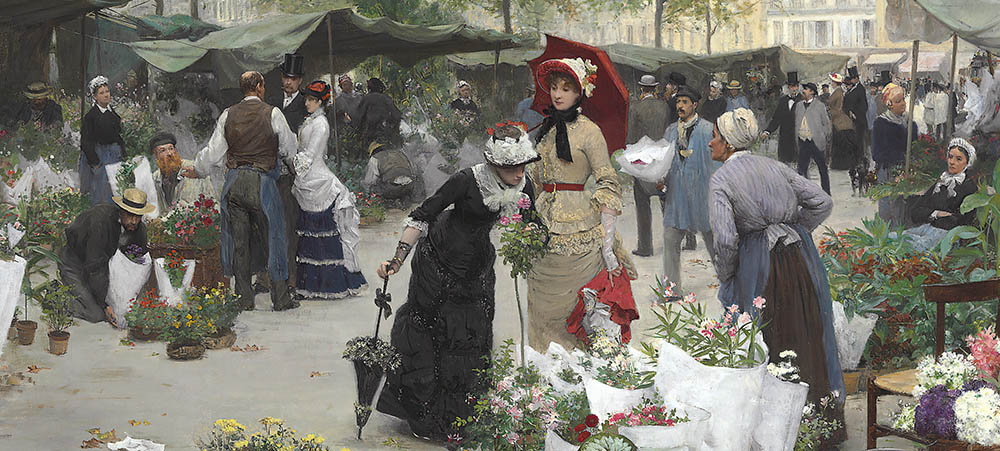In Defense of Loveliness
The partisans of lost culture are quick to praise the big ideals: Beauty, Goodness, Nobility, Virtue. Such ideals win wars, and rightly so. But loveliness deserves its own praise. The little ideals are worthy of some response if not war and death, and when neglected they have a way of making their spurned honor felt in the realm of the big ideals eventually. The modern world hurts for lack of it, although the world as a whole—the real world—is just as full to the brim of loveliness as it has ever been. We have forgotten, however, how to look for it, and I suspect that we have forgotten this pleasant art because somehow we forgot how to sing its proper praise.
Loveliness is something more specific and lower in the hierarchy than beauty, but it is also something more important and more objective than the merely pretty. Loveliness is that gratuitous light that falls upon a situation, a person, or even a common object adding to it a more than common luster. The opposite of the lovely is the drab, the aggressively banal. Loveliness is not shocking or awe inspiring; it does not rise to the level of the glorious. But it can give us pause if we slow down enough to see it and give it its due. The lovely is not useful; it is not efficient. Being gratuitous it is useless on purpose. Being without a market price it is precious.

Even among the little ideals, loveliness is quieter and friendlier than the rest. The lavish is quite expensive, and although it has its own unique pleasures, one wonders afterward whether it was all really worth it after all. The exquisite also has its place, but by its very nature, that place is exceptionally rare. It requires such a perfect alignment of all the pieces that only a master artist can pull it off and even he can only do so on his best days. The elegant is a little humbler than these but still belongs to the aristocratic class of virtues, requiring a gift of nature that not everyone possesses. The lovely, however, is the muse of ordinary things, slipping in subtle notes of divine inspiration, transforming bedrooms, eating utensils, cars and trucks, views from the balconies of cities, faces of children, boats pulled up on the shore, cigarettes where you least expect them, brick facades, hedgerows, and patio chairs. To add the notes of humble divinity to all these things costs something, certainly, but the cost is hardly felt. One almost wants to pay a little more lest loveliness seem cheap.
Anyone can be lovely, rich or poor, educated, or simple. One need not be an artistic genius since loveliness is a less exacting muse than her more famous sisters. It only takes the will to be so. Choose loveliness and the eye for it follows in time. The means present themselves, and with experience we learn that the means are almost always worth the expense.
Every encounter with a real value calls for a proper response on our part. Seeing the goodness of moral duty in a particular situation, for example, requires that we immediately act on that insight, no matter how heroically difficult the action may be. Duty calls for action. Loveliness, however, speaks so softly that we must lean in close to hear its call. When we do here it, we realize that loveliness also require a response, although it looks more like a kind of inaction than action. The lovely thing asks us to slow down as we pass by. It wants to be noticed and appreciated for what it is. A gentleman tips his hat. The attitude on our side that corresponds to the loveliness on the side of the object is—a pause. The pause need not be long, although it may be. The pause need not involve any further action, although marriages have been contracted and great projects begun out of the inherent potency of its nature. What it lacks in intensity and drama, the pause makes up for by the endlessly drinkable quality of its special pleasures. These pleasures never make one sick, they are not cloying, and they do not bring a sense of guilt in their wake. I will not say that these pleasures are the height or the essence of the good life—they are not so presumptuous—but I will say that they are additional ingredients that make the good life incomparably sweeter.
In many of life’s circumstances, loveliness comes as a surprise. We are driving to work with thoughts full of plans when the sunbeams strike the morning mist unbidden. But loveliness can also be hunted. She likes to be pursued. We can leave the most efficient way and take the meandering path where loveliness is likely to be. When we find her, however, we must catch up slowly. Don’t acted surprised (even if you are). Walk up to her as though you were leisurely going somewhere else or nowhere at all. Then, at the last moment, spring your trap: casually look up with just that hint of a wink and say, “Oh, it’s you.”
Loveliness can also be cultivated, and cultivated loveliness has the advantage of being more lasting. Loveliness is a delicate flower, so the trick is not to try too hard. Find a little ordinary thing and make one change. Preserve the essence of what it was; only lift it up a bit. Dignify it. Let it show you how it has been lovable all along and in what way, then make it more so. Pour the tea into this mug rather than that one. Put a little violet in your lapel just for fun. Write someone a kind word by hand.
We can become a source of loveliness radiating outward into everything we touch, if we choose to love it as a way of life. Such a way of life demands that we sacrifice a little time and money, of course. An hour that could be devoted to some more profitable scheme we give to a walk instead. Money that could purchase some concrete and sensible benefit we spend at a thrift store on a painting for someone else. The life devoted to loveliness, however, also demands more spiritual sacrifices from our inner personality. We cannot be mean, we cannot be loud (except when the music or the drama, literal or moral, builds to a crescendo), we cannot be glitzy or garish, we cannot be lazy or sloppy. It demands that we sacrifice any classist snobbery, but it also demands that we sacrifice all defensive lowbrow philistinism. We may have to work to develop a taste for music that we did not grow up with or wear something on our legs besides sweatpants. We may even have to learn how to be pleasant to other people. The sacrifices that we heap in the sacred grove to this quiet goddess, however, make a splendid bonfire in the night. We can even learn to dance around their loss.
